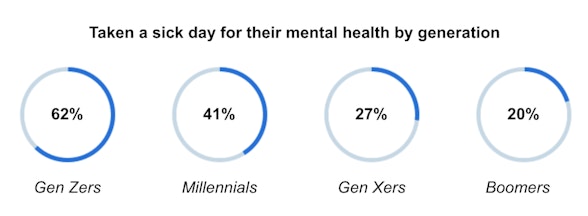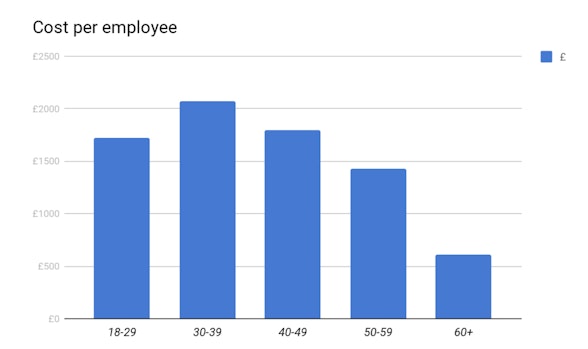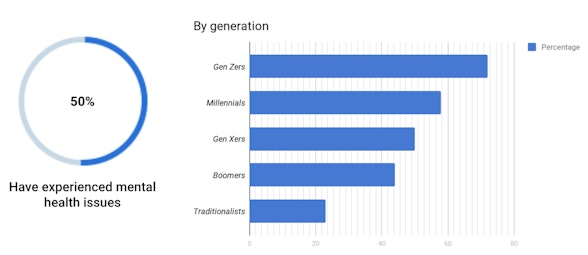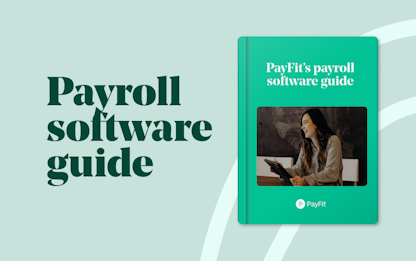- Blog
- |People management
- >Employee wellbeing
- >Mental Health Awareness Week
Mental Health Awareness Week


Today is the start of Mental Health Awareness Week, and, to mark the occasion, we’ve written an article that focuses on mental health in the workplace, how companies can look to improve the mental wellbeing of their staff, the scale of mental wellbeing problems and why it's often underestimated.
For several years now, there has been a concerted global effort to raise awareness and increase understanding of mental health problems and the impact they have on businesses and economies.
Since 2001, the Mental Health Foundation has run the UK’s annual Mental Health Awareness week to draw attention, encourage discussion and reduce the stigma surrounding mental health.
This year, particularly with the outbreak of the coronavirus pandemic, the week takes on even greater significance.
Various lockdown measures introduced by governments across the world have meant that many people have been forced to stay at home and limit social contact and interaction.
With this in mind, there can be little doubt that the pandemic will have exacerbated mental health problems and left many vulnerable people suffering alone and without access to the necessary support structures to combat the issues they are facing.
What is mental health?
Mental health defined
Mental health is “a person’s condition with regard to their psychological and emotional wellbeing.”
The operative words in this definition are the words “psychological” and “emotional”. Unlike other illnesses, mental health isn’t easily spotted by the untrained eye and doesn’t always provide obvious signs.
The fact that mental health problems are “invisible” means that sufferers can often go under the radar and their condition may be unconsciously ignored or missed entirely by those around them.
What is the cost of mental health?
Measuring the actual cost of poor mental health is complicated for a variety of reasons.
The stigma surrounding the subject means that there is often a reluctance to reveal personal problems, and furthermore, a staggering 69% of people remain officially undiagnosed.
According to a study conducted by Deloitte, mental health problems cost UK employers £45 billion in 2019.
One of the most significant contributors to that total was a rise in presenteeism at the cost of £29 billion. Twenty years ago the term was not even in use, yet today nearly nine in ten people admit to going to work when unwell.
What is "presenteeism"?
Presenteeism is when someone turns up to work when ill or when they work beyond their allocated hours.
The rise in presenteeism can be attributed to many things. Two of the most significant causes are long working hours and pressure from managers.
But while presenteeism has undoubtedly impacted the overall cost of mental health, other social issues have also been a cause.
Mental health at work
If the cost of mental health to UK employers was not concerning enough, the stats regarding overall mental health problems in the workplace reveal just how widespread the problem is.
According to a study conducted by the career resource site Milkround, 16 million UK workers have suffered from mental health problems.
Delving deeper into the study reveals the stark reality regarding mental health and the stigma surrounding it.
Milkround’s study revealed that only 14% of respondents felt they could be honest with their employers about their need to take a mental health sick day, and almost 25% suggested that their job had negatively impacted their mental health.
Did you know?
There is no legal difference between a sick day and a mental health sick day.
Despite the high number of people suffering, its taboo nature has meant that only 29% of people have taken time off to care for their mental health.
The reluctance to take a mental health sick day can be attributed to concerns that colleagues may make assumptions or the uncertainty about discussing the issue with employers. Perhaps most worrying is that 23% felt that taking a day off due to mental health issues could damage their career prospects.
Did you know?
Women in full-time employment are almost twice as likely to suffer from a mental health problem than men who are also employed on a full-time basis (18.8% vs 10.9%).
When concentrating on just younger generations, the statistics take an even more worrying turn.
Milkround’s study proves just that, with 62% of gen zers and 41% of millennials having to take a day off work to care for their mental health. This is opposed to the two generations preceding them, gen xers (27%) and boomers (20%).

These figures are reinforced by Deloitte’s study, which revealed that the average annual cost of mental health problems for companies varied from £609 to £2,068 per employee.

The cost variation is particularly evident when compared between different generations, with millennials or gen zers being almost three times higher than that of their colleagues aged 60 or above.
These figures are essential in our understanding of the rising cost of mental health for UK employers. This year, it is expected that upwards of 50% of the UK workforce will be made up of people aged between 18–39.
Did you know?
A recent survey conducted in the US, and published in the Harvard Business Review, revealed that 50% of millennials and 75% of gen zers had left a job because of mental health reasons.
Why is mental health so bad in young people in the UK?
A combination of issues has combined to create a situation where, according to Milkround, almost 75% of gen zers and nearly 60% of millennials have experienced mental health problems.

The environment in which millennials and gen zers have grown up is entirely different to that of any other generation before. There can be little doubt that the technological age, increased digitalisation and the birth of social media are likely contributors to an increased rise in mental health issues.
A 2017 academic study found a link between the use of social media platforms and increased depression and anxiety symptoms in young people aged 19-32.
But while social media may play a factor, other generational issues are likely to have a longer-term impact on the mental wellbeing of young people.
Over the last 50 years, there has been an expectation that each generation would surpass the achievements of the one that came before it. However, for the first time in living memory, this seems unlikely to be the case.
Money problems are without a doubt a leading cause of mental health among young people; a Business in the Community survey revealed that 90% of young people questioned in 2018 said that the cost of living impacted their mental health.
The aftershocks of the 2008 financial crisis have led to millennials suffering a pay squeeze that has severely impacted their earnings over the last decade. In a 2019 study, The Resolution Foundation revealed that people who were in their 20s at the height of the recession were earning on average 7% below the level prior to the crisis beginning.
Sadly, if predictions are to be believed, gen zers will have to navigate their way through a similar post-coronavirus financial crash too.
Did you know?
According to a survey conducted in 2017 by the Varkey Foundation, UK millennials and gen zers have one of the worst states of mental wellbeing in the world.
What can be done to reduce the impact of mental health at work?
In recent years, there has been a concerted effort by employers to ensure that support structures and wellbeing programmes are in place to help employees who are struggling with their mental health.
While this is an excellent first step, there is still significant work to be done to ensure that the stigma surrounding the subject is removed.
A better understanding of the causes and reasons behind mental health is another way that companies can reduce the impact within their organisation.
The World Health Organisation (WHO) recently said that there would be a worldwide workplace burnout pandemic within a decade. Although we may be facing a pandemic of a different nature at present, the causes that have led to this worrying prediction can be more effectively addressed within companies.
Through better managing working hours and workloads, as well as providing the right resources for employees to perform their duties, companies can create the foundations of a workplace environment and culture that encourages good working practices.
Organisations such as Perkbox, an employee experience platform, have worked hard to create a company culture that encourages openness and honesty regarding mental health.
Senior leaders openly discussed the importance of mental wellbeing and, after noticing some level of burnout within specific teams, relaunched and encouraged the use of their existing Employee Assistance Programme which provided free, impartial and confidential advice for employees.
“Mental health awareness week is great, but we should be encouraged to talk, promote and look after mental wellbeing all year, every year. Today and every day, it should be our priority.”
Maddie Pozlevic, Employee Experience Leader @ Perkbox
This year, given the additional challenges faced by employees as a result of coronavirus, Perkbox’s HR team have been releasing a list of proactive measures for managers to keep in mind as they work with their teams.
Did you know?
The Mental Health Foundation has created a short book that provides advice to both employers and employees on how to best support mental health in the workplace.
Mental Health Startups coming to the rescue
For a considerable amount of time, the mental health sector has been benefiting from strong growth and investment.
Mental health startups boom as pandemic anxieties worsen.
In the last five years, there has been an increase of almost £500 million in funding for mental health startups according to a study by Octopus Ventures.
One such company to benefit from this increased investment is Unmind, a mental health platform built to empower employees to proactively and measurably improve their mental wellbeing.
Unmind have so far managed to raise over £10 million to help expand their project and can boast a portfolio of customers including John Lewis, William Hill and Made.com.
What is Unmind?
Unmind is a workplace mental health platform built on the belief that everyone has the right to a healthy mind.
Their digital platform empowers employees to proactively measure and manage their mental health through scientifically backed assessments, tools, training and signposting.
By working with the world’s top clinicians, academics, and authors, as well as combining the latest research from positive psychology, cognitive behavioural therapy, neuroscience, and mindfulness, they are able to support organisations to access aggregated and anonymous data, allowing them to make informed decisions about their wider mental health strategy.
Mental health helplines
Want to talk more about mental health? There are several helplines available, including Samaritans, Anxiety UK, Mind, OCD Action UK. There is also a list of other hotlines on the NHS NHS website.


Types Of Flexible Working - A Guide For Employers

What is Flexible Working Within the UK Workplace?

Understanding the Paternity Leave Changes in 2024

International Day of Transgender Visibility Guide

A Guide to 360 Degree Feedback for UK HR Teams

